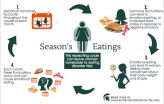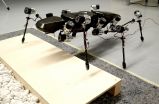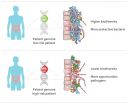Season's eatings
2014-12-16
(Press-News.org) EAST LANSING, Mich. - 'Tis the season of plenty of food and drink. While celebrating should be joyful, for some women, it's not. All the holiday temptations can add another layer to an already complicated biological process.
It's well known that women undergo hormonal changes every month due to the menstrual cycle. These changes can cause women to eat more, which is a natural, biological occurrence.
However, Michigan State University Foundation Professor Kelly Klump has found that the increased food intake causes some women to become much more preoccupied with their body weight and shape. This intensified obsession can increase the risk of developing eating disorder symptoms.
But the crux of the matter is that women are biologically wired to increase their food intake during their monthly cycle in preparation for pregnancy - it's supposed to happen.
Klump said the changes in food intake are all part of a natural, evolutionary process. Each month, the female body undergoes a menstrual cycle marked by changes in the hormones estrogen and progesterone. Monthly fluctuations in hormones cause women to increase the amount of food they eat and also causes emotional eating, which is the tendency to over consume food in response to negative emotions.
"In our culture, we tend to view any increased eating by a woman as a negative thing, even when that gain is biologically and evolutionarily driven," Klump said. "This is a potentially dangerous chain of events that could lead to serious and life threatening eating disorders, including anorexia nervosa and bulimia nervosa. This can be especially problematic during the holidays.
In a study published in the International Journal of Eating Disorders. Klump and co-lead author Britny Hildebrandt, MSU graduate student, said future work in this area will try to determine what other factors, in addition to emotional eating, drive pathological eating disorder symptoms in women across reproductive and hormonal stages.
INFORMATION:
The study was supported by a grant from the National Institute of Mental Health. Contributing to the study were Cheryl Sisk, Michigan State University; Sarah Racine, Ohio University; Pamela Keel, Florida State University; Michael Neale, Virginia Commonwealth University; and Steven Boker, University of Virginia.
[Attachments] See images for this press release:


ELSE PRESS RELEASES FROM THIS DATE:
2014-12-16
ITHACA, N.Y. - In the fight against global warming, carbon capture - chemically trapping carbon dioxide before it releases into the atmosphere - is gaining momentum, but standard methods are plagued by toxicity, corrosiveness and inefficiency. Using a bag of chemistry tricks, Cornell materials scientists have invented low-toxicity, highly effective carbon-trapping "sponges" that could lead to increased use of the technology.
A research team led by Emmanuel Giannelis, the Walter R. Read Professor of Engineering in the Department of Materials Science and Engineering, has ...
2014-12-16
HOUSTON -- (Dec. 16, 2014) -- In one of the most comprehensive laboratory studies of its kind, Rice University scientists traced the uptake and accumulation of quantum dot nanoparticles from water to plant roots, plant leaves and leaf-eating caterpillars.
The study, one of the first to examine how nanoparticles move through human-relevant food chains, found that nanoparticle accumulation in both plants and animals varied significantly depending upon the type of surface coating applied to the particles. The research is available online in the American Chemical Society's ...
2014-12-16
This news release is available in German. A research team at Bielefeld University has succeeded in teaching the only robot of its kind in the world how to walk. Its first steps have been recorded in a video. You can watch them in Bielefeld University's latest posting on 'research_tv'. The robot is called Hector, and its construction is modelled on a stick insect. Inspired by the insect, Hector has passive elastic joints and an ultralight exoskeleton. What makes it unique is that it is also equipped with a great number of sensors and it functions according to a biologically ...
2014-12-16
DURHAM, N.C. - Duke University scientists have developed new forensic tracers to identify coal ash contamination in water and distinguish it from contamination coming from other sources.
"These new tools can be used by federal and state regulatory agencies to monitor the environmental effects of coal ash and determine whether it has or hasn't impacted the environment," said Avner Vengosh, professor of geochemistry and water quality at Duke's Nicholas School of the Environment. "They can be used to trace the coal ash effluents to their source, even in watersheds where ...
2014-12-16
Washington, D.C.--New work from Carnegie's Ivan Naumov and Russell Hemley delves into the chemistry underlying some surprising recent observations about hydrogen, and reveals remarkable parallels between hydrogen and graphene under extreme pressures. Their work is the cover story in the December issue of Accounts of Chemical Research.
Hydrogen is the most-abundant element in the cosmos. With only a single electron per atom, it is deceptively simple. As a result, hydrogen has been a testing ground for theories of the chemical bond since the birth of quantum mechanics ...
2014-12-16
MINNEAPOLIS/ST. PAUL (12/16/2014)--A new study by an international team of researchers shows for the first time that people may inherit some of the intestinal bacteria that cause Crohn's disease and ulcerative colitis, collectively know as inflammatory bowel disease (IBD). The study, recently published in Genome Medicine, also confirmed that antibiotics could worsen the imbalance in the gut microbes.
About 1.6 million Americans suffer from Crohn's disease or ulcerative colitis, according to the Crohn's and Colitis Foundation of America. Understanding the causes of these ...
2014-12-16
AMHERST, Mass. - In a follow-up to her earlier studies of learning in infancy, developmental psychologist Lisa Scott and colleagues at the University of Massachusetts Amherst are reporting that talking to babies in their first year, in particular naming things in their world, can help them make connections between what they see and hear, and these learning benefits can be seen as much as five years later.
"Learning in infancy between the ages of six to nine months lays a foundation for learning later in childhood," Scott says. "Infants learn labels for people and things ...
2014-12-16
WASHINGTON, DC--December 16, 2014--Using mathematical modeling, researchers at New York and Vanderbilt universities have shown that commensal bacteria that cause problems later in life most likely played a key role in stabilizing early human populations. The finding, published in mBio®, the online open-access journal of the American Society for Microbiology, offers an explanation as to why humans co-evolved with microbes that can cause or contribute to cancer, inflammation, and degenerative diseases of aging.
The work sprung from a fundamental question in biology ...
2014-12-16
INDIANAPOLIS -- In the first real-world trial of the impact of patient-controlled access to electronic medical records, almost half of the patients who participated withheld clinically sensitive information in their medical record from some or all of their health care providers.
Should patients control who can see specific information in their electronic medical records? How much control should they have? Can doctors and other clinicians provide safe, high-quality care when a patient's preference may deny members of the medical team from seeing portions of the electronic ...
2014-12-16
BALTIMORE, MD (Dec. 16, 2014)--With a unique, multi-faceted approach, researchers at the Lieber Institute for Brain Development (LIBD) have quantified the effect of previously unidentified anomalies in genetic expression that determine how the human brain develops from its earliest stages. Their work, published online December 15th in Nature Neuroscience, offers a novel technique for identifying biological markers in brain development that associate with risk for neurodevelopmental disorders such as schizophrenia and autism spectrum disorder (ASD).
Using state-of-the-art ...
LAST 30 PRESS RELEASES:
[Press-News.org] Season's eatings







